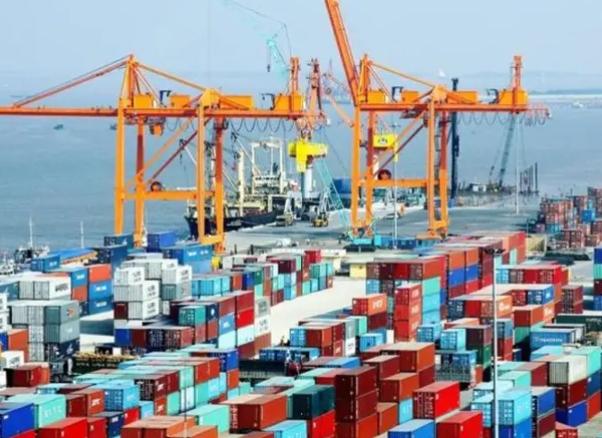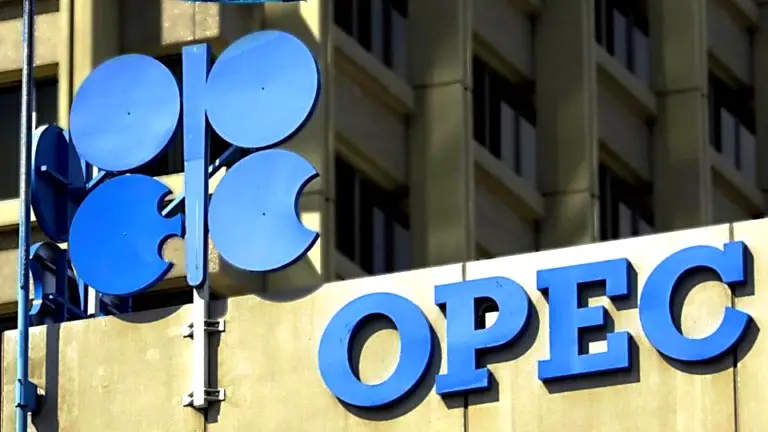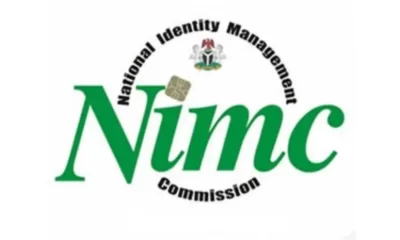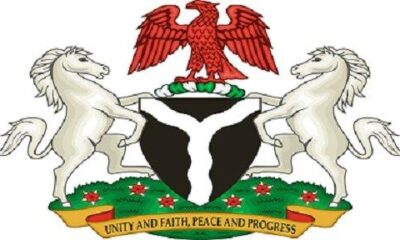Business
FG Approves N180m for PSTT To Fight Corruption At Nigerian Seaports
Published
12 months agoon
By
Editor
The Permanent Secretary of the Ministry, Dr. Magdalene Ajani, said his at the 3rd roundtable on Maritime Sector Reforms: “Consolidating the Gains,” held in Lagos on Wednesday.
The roundtable was organised by the Maritime Anti-Corruption Network (MACN) and Convention on Business Integrity (CBI).
Ajani was represented by Babatunde Sule, who noted that the Federal Government instructed Nigerian Shippers’ Council (NSC), Nigerian Ports Authority (NPA) and Nigerian Maritime Administration and Safety Agency (NIMASA) to provide funds and operational vehicles for the PSTT.
Ajani added that the government agencies were instructed to provide N60 million each for the Port Standing Task Team to carry on the anti-corruption crusade across the nation’s ports.
READ ALSO: Investors Sue Adidas In US For Axing Kanye West
“Port administration policy is such that port users are able to demand, track, and ensure greater compliance with Standard Operating Procedures (SOPs) by government agencies.
“And so, incidences of corrupt demands as it relates to vessel clearance has reduced.
“Government capacity to establish policy on compliance systems and collaborate with the private sector and civil society to improve trade flows and the ease of doing business are being strengthened,” she said.
She said that the ministry, through the NSC, the Technical Unit on Government and Anti-Corruption Reforms (TUGAR), and other agencies, Nigeria was poised to augment its standing by further institutionalising and continuously sustaining its reforms.
READ ALSO: World Bank Appoints New President
The National Coordinator of PSTT, Mr Moses Fadipe, confirmed the approval for the operations of the task team, adding that only NSC, being the leading agency, had responded to the government’s instruction.
He revealed that other agencies, which included NIMASA and NPA, were yet to respond and the PSTT had not received anything from them.
Fadipe noted that the Nigerian maritime sector had made significant progress towards promoting efficiency and transparency in recent years.
“The PSTT has played a significant role in transforming the sector through its commendable monitoring and enforcement of adherence to the provisions of the Nigerian Ports Process Manual and in its discharge of other ancillary mandates.
READ ALSO: Senate Approves Restructuring Of N22.7tn Debt
“The task team’s interventions have led to a reduction in inefficiencies and corruption, and there has been a positive impact on the economy.
“Strict monitoring and enforcement of joint boarding of vessels procedure, transparency in monitoring, strict monitoring of joint cargo examinations, and the dismantling of illegal checkpoints and extortion points have all contributed to the improvement of the sector,” he said
You may like


FG Sets Up Committee To Oversee Cancer Health Fund


Presidency Unveils Platform For Citizens’ Feedback


BREAKING: FG Extends Public Holiday For Eid-El-Fitr Celebration


BREAKING: FG Declares Public Holiday For Eid-el-Fitr Celebration


FG Plans New National ID Card With Payment, Social Features


DMO Opens FG Savings Bond Subscription At 18.06%
Business
Nigeria’s Oil Production Drops Again, Now 1.23mbpd – OPEC
Published
4 days agoon
April 12, 2024By
Editor
Nigeria’s crude oil production witnessed the second consecutive monthly decline since the beginning of this year, as it dropped to 1.231 million barrels per day in March, the Organisation of Petroleum Exporting Countries stated on Thursday.
OPEC disclosed this in its latest Monthly Oil Market Report for April 2024, stating that crude oil production details which it got through direct communication from Nigeria showed that the country pumped less oil in March when compared to what was produced in February.
Data from the report indicated that Nigeria produced 1.322 million barrels per day of crude in February this year, but this dropped to 1.231mbpd in March, representing a plunge of 91mbpd.
The report further stated that the country had produced 1.427mbpd of crude in January, but this was not sustained in February as it dropped in that month, while the southward oil production continued in March.
OPEC data, however, showed that the country’s average crude oil production in the first quarter of 2024 was 1.327mbpd, higher than the 1.313mbpd average oil production in the fourth quarter of 2023.
Nigeria’s first quarter oil output in 2024 was also higher than the 1.201mbpd average production in the third quarter of last year.
READ ALSO: Oil Production Rises 26.57m Bpd In February — OPEC
Oil theft and pipeline vandalism have dealt severe blows on Nigeria’s oil production, limiting the country’s output and making it fall below the volume approved for Nigeria by OPEC.
The PUNCH reported on Wednesday that the Nigerian National Petroleum Company Limited recorded 155 oil theft incidents in one week.
The report that stated the company revealed that during the review period, 53 illegal pipeline connections and 36 illegal refineries were uncovered in the Niger Delta.
“Between March 30 and April 5, 2024, a total of 155 incidents were recorded across several locations in the Niger Delta region from various incident sources,” the firm stated.
In a summary of the incidents, NNPCL stated that it recorded 53 illegal connections, discovered 36 illegal refineries and 32 wooden fibre boats, identified 14 pipeline vandalism cases, eight vessel infractions and four oil spills, as well as made seven vehicle and one vessel arrests.
Some of the incident sources include the Nigeria Agip Oil Company, Tantita Security Services Ltd, NNPCL Command and Control Centre, Shell Petroleum Development Company, NNPCL 18 Operating Ltd, among others.
READ ALSO: Oil Drops Further After OPEC Delay With Asian Stocks Mixed
Providing additional details, the company said, “In the past week, 32 wooden boats conveying stolen crude and illegally refined products were seized and confiscated in Rivers and Delta states.
“On land, seven vehicles loaded with stolen crude were arrested in Imo, Delta and Rivers states. 53 illegal connections were uncovered between March 30 and April 5, 2024 in Bayelsa, Rivers and Delta states.
“14 cases of vandalism were also recorded in Rivers, Bayelsa and Delta states, while illegal storage sites where stolen crude and illegally refined products are kept were uncovered in Akwa Ibom, Bayelsa, Rivers and Delta states.”
The national oil company also stated there were clusters of illegal refineries in Abia State, as activities of oil thieves had devastated the effected environments in the state.
It said 36 clusters of the illegal refineries were discovered in the past week across several locations in Rivers and Abia states.
“Four cases of oil spills due to activities of vandals were recorded in the past week,” NNPCL stated, adding that in Rivers State, oil leaks from a wellhead is destroying aquatic lives.
NNPCL stated that 38 suspects were arrested during the week under review, stressing that the national oil company would not back down on the war against crude oil theft until the menace is eradicated.
READ ALSO: OPEC Cuts Nigeria’s Oil Output By 20.7% To 1.38 mb/d
Nigeria has been losing trillions of naira to crude oil theft, a development that has made some international oil companies to divest from onshore to deep offshore oil fields, while others have exited the country.
In November 2023, for instance, The PUNCH reported that the Federal Government revealed that more than N4.3tn worth of crude oil was stolen in 7,143 pipeline vandalism cases within a period of five years.
The report stated that the government disclosed this at the Nigeria International Pipeline Technology and Security Conference in Abuja, with the theme, ‘Bolstering Regulations, Technology and Security for Growth.’ The conference was organised by the Pipeline Professionals Association of Nigeria.
In a presentation at the conference by the Nigeria Extractive Industries Transparency Initiative, a Federal Government agency, the organisation revealed that oil theft and losses in Nigeria had become a national emergency.
The Executive Secretary, NEITI, Ogbonnaya Orji, said oil theft was an emergency that posed serious threat to oil exploration and exploitation with huge negative consequences on economic growth, business prospects and profit earnings by oil companies.
Providing data from the agency’s reports to back his claims, he said, “NEITI disclosed that in the last five years, 2017 to 2021, Nigeria recorded 7,143 cases of pipeline breakages and deliberate vandalism resulting in crude theft and product losses of 208.639 million barrels valued at $12.74m or N4.325tn.
“NEITI reports also disclosed that during the same period Nigeria spent N471.493bn to either repair or maintain pipelines.”
PUNCH
Business
Banks Get Three-month Deadline To Stop Forex-backed Loans
Published
1 week agoon
April 9, 2024By
Editor
The Central Bank of Nigeria on Monday stepped up its fight to boost foreign exchange liquidity in the economy with a new circular mandating Deposit Money Banks to stop the use of foreign currencies as collateral for naira loans within 90 days.
The development happened as the naira rose against the greenback at both the official and parallel markets on Monday.
The CBN has continued to deepen its battle to free dollar liquidity stocked up in the financial system by deploying various measures aimed at shoring up the naira against the United States dollar.
On Monday, the Olayemi Cardoso-led CBN issued a new circular, expressing concerns over the use of foreign currencies as collateral for naira loans.
The circular made available on its website and titled “The use of foreign-currency-denominated collaterals for naira loans”, was referenced BSD/DIR/PUB/LAB/017/004.
Although this is not the first time the bank has prohibited the use of FCY, it said it had observed the use of foreign currency by bank customers as collateral for naira loans. Hence, the decision to prohibit its use.
READ ALSO: JUST IN: CBN Sells FX To BDCs At N1,101/$1
In 2023, in a confidential letter to commercial lenders, the apex bank issued a stern directive against naira overdrafts backed by foreign currency deposits.
In the leaked letter dated August 17, 2023, and signed by the Director of Banking Supervision, Mr. Haruna B. Mustafa, the CBN said the development followed its findings from a recent supervisory review.
It was uncovered that the banks had been offering naira overdraft facilities secured with foreign currency deposits.
Despite this warning, the new directive indicates that banks have continued to engage in such practices.
In the latest circular signed by the acting Director, Banking Supervision Department, Adetona Adedeji, the apex bank said it observed the use of foreign currency by bank customers as collateral for naira loans.
As such, the regulator directed banks to trim all existing loans with foreign currency collaterals to 90 days or attract a 150 per cent capital adequacy ratio computation as part of the bank’s risk.
The new directive means a borrower may no longer use dollar deposits in their domiciliary bank accounts as collateral to obtain naira loans.
READ ALSO: EFCC Arraigns Three Ex-bankers, One Other For N15.9m Fraud
According to stakeholders, the practice is partly due to the need to hedge against foreign currency spikes which can be costlier than interest rates.
“The Central Bank of Nigeria has observed the prevailing situation where bank customers use foreign currency as collaterals for Naira loans.
“Consequently, the current practice of using foreign currency-denominated collaterals for Naira loans is hereby prohibited except where the foreign currency collateral is Eurobonds issued by the Federal Government of Nigeria or guarantees of foreign banks, including standby letters of credit.
“In this regard, all loans currently secured with dollar-denominated collaterals other than as mentioned above should be wound down within 90 days, failing which such exposures shall be risk-weighted 150% for Capital Adequacy Ratio computation, in addition to other regulatory sanctions,” the circular read.
The CBN’s stance against such practices arises from concerns of currency mismatch, which could introduce substantial financial risks for banks.
READ ALSO: Band A Customers Decry Extortion By Power Firms Amid Poor Supply
Rather than convert their dollars to naira, some borrowers will rather borrow in naira as the cost of buying the dollars back might be higher than the interest rate they pay for borrowing in naira.
However, this can have a ripple effect on the exchange rate due to its speculative tendencies.
The CBN maintained that it was on a mission to ensure adequate foreign exchange in the market even as the naira gains strength.
Eurobonds, according to the Hong Kong and Shanghai Banking Corporation, are bonds issued offshore by governments or corporations denominated in a currency other than that of the issuer’s country.
Eurobonds are usually long-term debt instruments and are typically denominated in US dollars.
READ ALSO: Top 10 Richest Women In The World 2024
Letters of Credit, according to the International Trade Administration, are contractual commitments by the foreign buyer’s bank to pay once the exporter ships the goods and presents the required documentation to the exporter’s bank as proof.
As a trade finance tool, Letters of Credit are designed to protect both exporters and importers.
The PUNCH reports that in the apex bank’s previous circular to all the banks signed by its former Director, Corporate Communications Department, Ibrahim Mu’azu, the bank said its attention was drawn to the increasing use of foreign currencies in the domestic economy as a medium of payment for goods and services by individuals and corporates.
It also observed that some institutions price their goods and services in foreign currencies and demand payments in foreign currencies rather than the domestic currency (the Naira), which is the legal tender in Nigeria.
The CBN stated, “For the avoidance of doubt, the attention of the general public is hereby drawn to the provisions of the CBN Act of 2007, which states inter-alia that “the currency notes issued by the Bank shall be legal tender in Nigeria…for the payment of any amount.”
Furthermore, the Act stipulates that any person who contravenes this provision is guilty of an offence and shall be liable on conviction to a prescribed fine or six months imprisonment.

The Central Bank of Nigeria has issued a circular to Bureau De Change operators informing them of the sale of $10,000 to each BDC at a rate of N1,101/$1.
This was contained in a post on the CBN X platform , on Monday, 8th April, 2024.
The apex bank directed each BDC to sell the dollars to eligible customers at a rate not exceeding 1.5 per cent above the purchase price, implying that each BDC is not expected to sell above N1,101/$1.
READ ALSO:Peter Obi Speaks On Rumoured Plan Exit From Labour Party
All eligible BDCs are therefore directed to commence payment of the Naira deposit to the underlisted CBN Naira Deposit Account Numbers from Today Monday April 05, 2024, and submit confirmation of payment with other necessary documentation for disbursement at the appropriate CBN Branches

Transformer Vandal Met Waterloo, Electrocuted In Benin

JUST IN: Kaduna Assembly Sets Up Committee To Probe El-Rufai

JUST IN: NCAA Suspends Three Private Jet Operators For Operating Commercial Flights
Trending

 Metro3 days ago
Metro3 days agoWoman S*xually Abuses Child, Films It In Viral Video

 Entertainment3 days ago
Entertainment3 days agoJnr Pope: ‘That Guy No Suppose Knack Bell’ – Boat Captain Narrates His Own Side Of Story [VIDEO]

 Headline5 days ago
Headline5 days agoFemale Billionaire Sentenced To Death For Looting $44bn

 News3 days ago
News3 days agoDeadly Flog: Girl Caught In Camera Beating Up Baby With Rod [VIDEO]

 Metro4 days ago
Metro4 days agoJUST IN: Bobrisky Jailed With No Option Of Fine

 News2 days ago
News2 days agoVideo: Moment Pastor Enenche Sent Lady Away For Giving False Testimony On The Altar

 Metro5 days ago
Metro5 days agoPolice Arrest Man For Murder Of 19-year-old Girlfriend In Delta

 Entertainment4 days ago
Entertainment4 days agoWhy Court Sentenced Bobrisky To Six Months In Prison

 Entertainment3 days ago
Entertainment3 days agoBoat Mishap: ‘This Is My Story’ – Movie Producer, Adanma Luke, Breaks Silence [VIDEO]

 News5 days ago
News5 days agoHow Nigerian-born Obidi Was Stabbed Bathed With Acid In UK – Sister, Umeh [VIDEO]




























